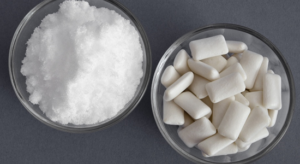
A recent study has raised concerns over the safety of xylitol, a popular low-calorie sweetener found in numerous reduced-sugar products such as gum and toothpaste. According to the study, published in the European Heart Journal, individuals consuming the highest levels of xylitol faced nearly double the risk of heart attacks, strokes, and death compared to those with lower intake.
Dr. Stanley Hazen, senior author of the study and director of the Center for Cardiovascular Diagnostics and Prevention at the Cleveland Clinic Lerner Research Institute, highlighted the significant findings. He explained that when volunteers consumed a typical drink containing xylitol, their blood levels of the sweetener surged dramatically, far surpassing the increase seen with natural sugars like glucose.
“This unprecedented rise in xylitol levels in human blood, driven by its widespread use in processed foods, is a recent phenomenon,” noted Hazen. He underscored that such high concentrations of xylitol have only emerged over the past few decades as the food industry increasingly substitutes sugars with sugar alcohols like xylitol.

The study also pointed out that xylitol and another sugar alcohol, erythritol, may prompt blood platelets to clot more easily, potentially leading to cardiovascular complications such as heart attacks and strokes. This aligns with previous research findings regarding erythritol, which similarly raised concerns about increased clotting tendencies.
Dr. Matthew Tomey, a cardiologist from Mount Sinai Fuster Heart Hospital in New York City, who was not involved in the study, cautioned that while the experimental results are intriguing, they do not conclusively prove a direct causal link between xylitol consumption and adverse cardiovascular events. However, he emphasized the need for further investigation into the potential health impacts of sugar substitutes.
The widespread use of xylitol in various consumer products, marketed for its low-calorie and sugar-free attributes, has made it a favored choice among individuals seeking to manage weight or blood sugar levels. Yet, Hazen cautioned that populations at risk for diabetes or cardiovascular disease may inadvertently increase their health risks by consuming xylitol regularly.
As regulatory bodies continue to classify sugar alcohols like xylitol as safe for consumption, the study urges a closer examination of their long-term effects on public health. The World Health Organization has previously advised caution regarding artificial sweeteners for weight management, citing the need for comprehensive toxicity studies.
In response to inquiries, the Calorie Control Council, representing the industry, did not provide comment prior to publication. The study’s findings underscore the ongoing debate over the role of sugar substitutes in modern diets and their potential implications for cardiovascular health.


